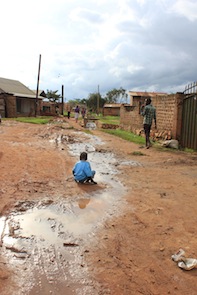Political Will – and Money – Needed for Disaster Management
By Joshua Kyalimpa
DURBAN, South Africa, Nov 30, 2011 (IPS) - Managing the impact of increased disasters due to climate change will only be possible if such efforts are led by local communities, say non-governmental organisations working in climate change.
"We cannot use the excuse of money - or the lack of it - not to do anything. Yes, developed countries have to make financial commitments, but what if they don’t?" asks Charles Hopkins of the charity CARE International in Ethiopia, an international humanitarian organisation.
A deal on climate change at Durban might still be a far-fetched dream, but climate change-related disasters are already taking a toll around the globe.
According to a report by the International Panel on Climate Change (IPCC), increases in some extreme weather and climate events have already been observed and further increases are projected over the 21st century.
The Special Report on Managing the Risks of Extreme Events and Disasters to Advance Climate Change Adaptation, evaluates the role of climate change in altering characteristics of extreme events. It assesses experience with a wide range of options used by institutions, organizations, and communities to reduce exposure and vulnerability, and improve resilience, to climate extremes.
Speaking at a press conference at United Nations 17th Conference of the Parties in Durban, South Africa, IPCC executive director Dr. Kristie Ebi highlighted that while total economic losses from natural disasters could be high in developed countries; economic losses expressed as a proportion of GDP could be higher in developing countries.
Ebi says the IPCC will soon start meeting policy makers and politicians around the world to urge them take up measures for disaster reduction: "We are committed to outreach events over the coming months with a hope that politicians and policy makers will be encouraged to advance climate change adaptation."
According to the IPCC report, deaths from natural disasters occur much more in developing countries. Information obtained from 1970 to 2008 by the experts’ shows that more than 95 percent of deaths from natural disasters were in developing countries.
Most governments have, however, not put in place policies for disaster risk reduction. Hopkins says governments, especially those in Africa, have to take to protect people and their property.
"People have to be given the right information because information on disaster reduction remains at the top and often the affected people don’t even get it," says Hopkins
Professor Richard Klein, of the Stockholm Environment Institute and a member of the international panel of experts, says people actually don’t have to rely on international agreements.
Read this article in detail at :- http://www.cdrn.org.in/show.detail.asp?id=22918

No comments:
Post a Comment